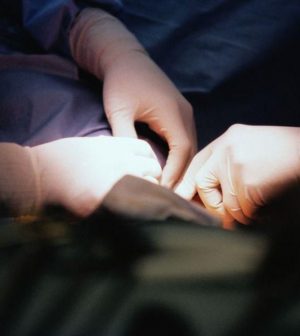- 7 Best Breads for Maintaining Stable Blood Sugar
- Gelatin vs. Collagen: Which is Best for Skin, Nails, and Joints?
- The Long-Term Effects of Daily Turmeric Supplements on Liver Health
- Could Your Grocery Store Meat Be Causing Recurring UTIs?
- Are You Making This Expensive Thermostat Error This Winter?
- Recognizing the Signs of Hypothyroidism
- 10 Strategies to Overcome Insomnia
- Could Artificial Sweeteners Be Aging the Brain Faster?
- Techniques for Soothing Your Nervous System
- Does the Water in Your House Smell Funny? Here’s Why
Some Sick Patients Get Cosmetic Surgery to Boost Appearance

Some patients with serious illnesses get cosmetic surgery to look healthier and be more comfortable in social situations or at work, a small study finds.
Researchers interviewed 12 patients who had cosmetic surgery at the start or during treatment for conditions such as stroke, advanced melanoma, prostate cancer, advanced cervical or thyroid cancer and Hodgkin’s lymphoma.
“Patients dealing with serious illnesses have visible signs of their health problems, which make them feel unhappy about themselves,” said senior author Dr. Murad Alam, vice chair of dermatology and chief of cutaneous and aesthetic surgery at Northwestern University Feinberg School of Medicine in Chicago.
“Cosmetic procedures that improve appearance make these patients feel better and more confident during a time when they are already going through so much,” he said in a school news release.
The cosmetic procedures patients had ranged from noninvasive treatments such as neurotoxin and filler injections, lasers, chemical peels, radiofrequency devices, dermabrasion and microneedling, to invasive procedures such as face-lifts, liposuction and eyelid lifts.
Most said they sought cosmetic surgery directly because of their major medical illness (75%) or treatment (66%).
Their reasons included mental well-being, social acceptance, counteracting aging, work benefits, and suggestions from friends, family and doctors.
“Post-treatment, you look in the mirror negative-wise,” a 34-year-old woman with breast cancer told researchers. “You have no hair, no eyebrows, no eyelashes, nothing. My immune system was severely low, so I looked really pale and anemic. It’s like you don’t even recognize yourself anymore.”
Many of the study participants said the safety of noninvasive cosmetic procedures made them more appealing, according to findings recently published in the Journal of the American Academy of Dermatology.
Alam said the findings “may help improve conversations between physicians and patients who are interested in getting cosmetic procedures, so that they have information on procedures that are most safe and helpful for them.”
More information
There’s more on cosmetic surgery at the U.S. National Library of Medicine.
SOURCE: Northwestern University Medicine, news release, April 5, 2022
Source: HealthDay
Copyright © 2026 HealthDay. All rights reserved.










